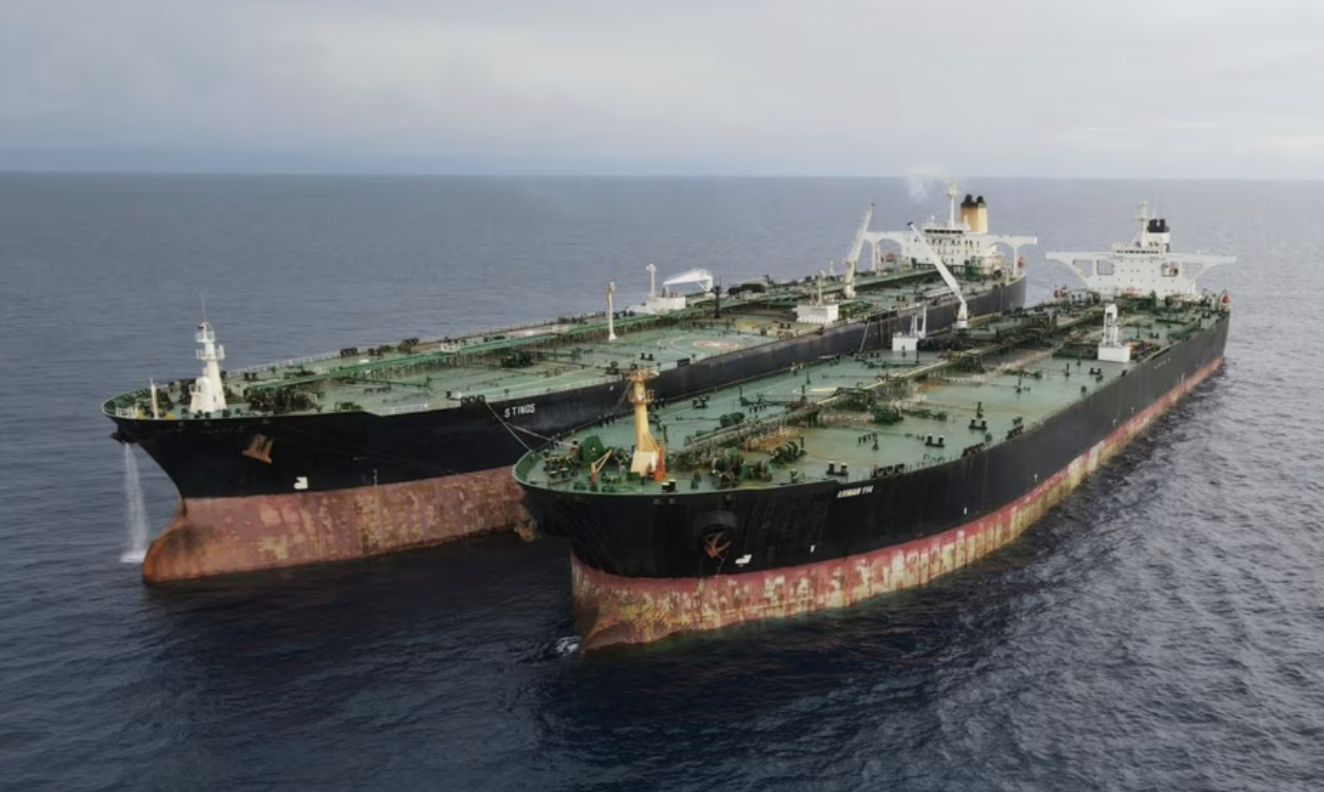Amid ‘Evasion Tactics’: How Washington Is Trying to Block Iranian Oil Exports

Iran produces nearly 3.2 million barrels of oil per day.
The United States continues to track Iran's oil exports and prevent Tehran from bypassing sanctions to fund its economy.
Experts affirm that Iran is somewhat successful in marketing and selling its oil, whether through circumventing methods or via friendly nations.
In response, it seems that the U.S. has countermeasures to Iran’s tactics, seeking to impose further measures to curb the lucrative oil trade, which is produced in abundance.
Monitoring Iran's Oil
In the latest of these efforts, Republican Senator Lindsey Graham proposed a legal plan on July 24, 2024, that would require Washington to impose tariffs on countries purchasing petroleum products from Iran.
The Republican senator presented this proposal after many discussions and consultations with presidential candidate Donald Trump.
He posted on X saying that “for a long time, those who support this terrorist regime should pay for their actions, and there is no better cost than imposing tariffs on goods entering the United States.”
If implemented, these tariffs would serve as an obstacle to Tehran's ability to export its oil to countries dealing with the United States.
In a press statement to the American website Jewish Insider on July 24, 2024, Lindsey Graham noted that “Iran uses its oil revenues to fund terrorism and its expanding nuclear program.”
Graham believes that one of the most effective ways to combat Iran is to isolate it economically.
Iran still produces about 3.2 million barrels of oil per day, according to the International Energy Agency, which ranks it ninth among the world's largest crude oil producers.
In June 2024, Graham said that “Iran had significantly enriched itself through oil sales in recent years and that sanctions were either being evaded by Iran or not enforced by the Joe Biden administration.”
“China is buying oil below market price from Iran and so are other countries, buying weapons and enriching this terrorist state,” Graham said at the time.

“Sanctions are important but they’ve been evaded way too often. So we’re proposing a tariff on any country who buys oil from Iran, because they’re buying oil below market price which gives their economy an advantage over ours. Nobody understands how to use tariffs better than President Trump.”
“One way to deal with this problem is to tell anybody and everybody, if you buy oil from the Iranians, then you’re going to have a tariff placed on your products when it comes to the United States. We have to hit Iran’s pocketbook,” he added.
However, it seems that China, the U.S.'s main competitor in many sectors, is not heeding Washington's warnings about oil dealings with Iran.
Oil tanker tracking companies and trade sources have reported that Iranian crude imports have been flowing since late 2023 to Dalian, a Chinese port city known for its refining activities, helping to keep the country’s oil purchases at near-record levels.
Traders told Reuters on July 27, 2024, that this flow occurred as demand for Iranian crude decreased from smaller buyers in Shandong Province, an independent refining hub, due to deteriorating refining margins caused by rising crude prices. These buyers have become the main purchasers of Iranian oil in China since 2019.
The United States reimposed sanctions on Iran in 2018 after withdrawing from the 2015 nuclear deal, which had allowed Tehran to sell oil in exchange for placing restrictions on its nuclear program.
Subsequently, the list of Iranian crude buyers sharply declined, and Iran directed most of its exports to China, with smaller quantities sent to Syria, its regional ally.
Available Market
China, however, has not stopped buying Iranian oil. Independent refineries, seeking to boost margins, have filled the gap left by state-owned companies wary of sanctions, according to Reuters.
Vortexa, a global company that tracks energy trades, reported that 23 shipments, totaling 45 million barrels of Iranian oil, were offloaded in Dalian between October 2023 and June 2024.
This included 28 million barrels discharged on Changxing Island, about 85 kilometers northwest of central Dalian.
KEPLER, another energy global energy company, estimated that China brought in 34 million barrels to Dalian during the same period.
These figures make an average of 164,000 barrels per day, nearly 13% of China’s total imports of Iranian oil in the first half of 2024.
China has stated that it opposes unilateral sanctions on Iran. However, oil tanker trackers and traders suggest that those dealing with Iranian oil reclassify it as originating from other locations, such as Malaysia, Oman, or the UAE.
Notably, the influx of Iranian oil, which found a new market in Northeast China, coincided with official data published on July 20, 2024, showing a decrease in China's crude oil imports from Saudi Arabia, its second-largest supplier after Russia.

Declining Saudi Shipments
Data showed a 14% year-on-year drop in shipments from Saudi Arabia to China in June 2024, totaling 6.82 million tons. Since the beginning of 2024, Saudi shipments have decreased by 13% year-on-year to 40.38 million tons, equivalent to 1.62 million barrels per day.
In a sign that some countries disregard U.S. sanctions on Iran, Iranian Oil Minister Javad Owji confirmed in early July 2024 that Tehran sells crude oil to 17 countries, according to the semi-official Mehr News Agency.
“We sell our oil wherever we want. In fact, we export to 17 countries, including [countries in] Europe,” said Owji in a video shared by the agency when asked about foreign reports that European countries are importing Iranian crude oil.
He added that he could not provide additional details regarding the amounts sold or the identity of the buyers due to the sensitivity of the subject.
On June 27, 2024, the United States imposed new sanctions on Iran in response to its "continued nuclear escalation." The new sanctions targeted three UAE-based companies accused of involvement in transporting Iranian oil and petrochemical products, along with 11 ships associated with these companies.
Two days earlier, the U.S. Treasury Department had imposed economic sanctions on a parallel banking network linked to the Iranian regime, claimed to be used for circumventing sanctions and accessing the global banking system. The sanctions targeted "50 entities and individuals forming branches of a sprawling parallel banking network."
Deputy Treasury Secretary Wally Adeyemo stated that “the United States is taking action against a massive parallel banking system used by the Iranian military to launder billions of dollars from oil and other illicit revenues.”
Washington claimed that “billions of dollars" had flowed through this network since 2020, asserting that the sale of oil and petrochemical products serves as revenue sources for the Iranian regime.
Senior U.S. Treasury officials have frequently noted that Iran relies on Malaysian service providers to circumvent sanctions and sell its oil in the region. On May 7, 2024, AFP cited an unnamed U.S. Treasury source who reported that oil shipments were sent to regional buyers through waters near Singapore and Malaysia.
The official stated that “Iran's ability to move oil has relied on this type of service provider based in Malaysia, and added that stopping these oil shipments would deal a critical blow to Iran's ability to fund these global attacks, including those by the Houthis, who currently threaten commercial navigation.”
In this context, SEB Bank analyst Ole Hvalbye observed that applying sanctions on Iran, particularly on its oil exports, could result in a loss of between half to 1 million barrels per day of oil supplies.
“Nonetheless, Iran's daily production is expected to remain above the estimated 1.9 million barrels it was producing in mid-2020, after then-President Donald Trump withdrew from the nuclear deal,” Hvalbye told AFP in April 2024.
‘Dark Fleet’
U.S. sanctions have cut Iran off from most of its traditional clients, forcing Tehran to seek new buyers and sell its oil at discounted prices. In recent years, Iran has increased its sales by circumventing sanctions, including using its "dark fleet" of tankers to illegally transport oil shipments to China.
These tactics involve ship-to-ship oil transfers, intermediaries, hidden financial transactions, and rebranding the oil to conceal its Iranian origin and make it appear as if it came from a third country.
As such, Iranian oil tankers play a significant role in evading sanctions by falsifying their locations or tampering with Automated Identification System (AIS) signals to forge documents. Experts note that even with substantial discounts, selling Iranian oil remains highly profitable and sustainable, as the marginal cost of production in Iran is around $15 or less per barrel.
Lloyd's List, covering maritime shipping news and market analysis, tracked 11 tankers sanctioned by the U.S. for their links to Iran between January and March 2024. It found that most of these tankers had disappeared, manipulated their locations, and some had raised false flag. In a report published on July 22, 2024, the site stated that seven of the tracked Iranian oil tankers had transmitted false location data via AIS since being listed.

Nader Itayim, Middle East editor at the UK-based Argus Media, noted that "Iran is continuously developing and expanding not only its network of intermediaries and trading companies involved in selling its oil but also its own fleet of crude oil tankers," as he told Radio Free Europe in early May 2024.
As a result, Iran is now exporting more oil than at any time in the past six years, generating $35 billion for its economy, even as Western countries consider tightening sanctions, according to a report by the Financial Times on April 18, 2024. The report stated that Tehran sold an average of 1.56 million barrels per day in the first three months of 2024, almost entirely to China, marking the highest level since the third quarter of 2018, according to Vortexa, a data analytics firm.
Although the current White House administration is working to reduce Iran’s oil export capabilities, analysts suggest that Tehran’s economic outlook remains more uncertain than ever, especially with the possibility of Trump returning to power, which could lead to even harsher sanctions on Iran’s oil sector.













